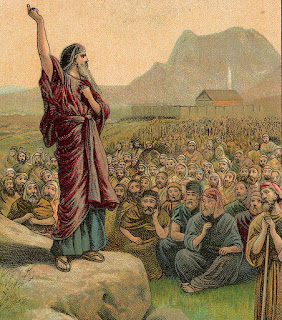The Prophetic Imagination Notes, part 5
Then Jesus spoke to the crowds and to his disciples: “The scribes and the Pharisees are seated in the chair of Moses. Therefore do whatever they tell you, and observe it. But don’t do what they do, because they don’t practice what they teach. They tie up heavy loads that are hard to carry and put them on people’s shoulders, but they themselves aren’t willing to lift a finger to move them. They do everything to be seen by others: They enlarge their phylacteries and lengthen their tassels. They love the place of honor at banquets, the front seats in the synagogues,greetings in the marketplaces, and to be called ‘Rabbi’ by people.
“But you are not to be called ‘Rabbi,’ because you have one Teacher, and you are all brothers and sisters. Do not call anyone on earth your father, because you have one Father, who is in heaven. You are not to be called instructors either, because you have one Instructor, the Messiah. The greatest among you will be your servant. Whoever exalts himself will be humbled, and whoever humbles himself will be exalted.
“But you are not to be called ‘Rabbi,’ because you have one Teacher, and you are all brothers and sisters. Do not call anyone on earth your father, because you have one Father, who is in heaven. You are not to be called instructors either, because you have one Instructor, the Messiah. The greatest among you will be your servant. Whoever exalts himself will be humbled, and whoever humbles himself will be exalted.
-Matthew 23:1-12
Quotes and notes from chapter 2, part 1 of The Prophetic Imagination, by Walter Brueggeman.
Royal Consciousness: Countering the Counterculture
Brueggemann:
Quotes and notes from chapter 2, part 1 of The Prophetic Imagination, by Walter Brueggeman.
Royal Consciousness: Countering the Counterculture
Brueggemann:
- I believe that Moses did not engage in anything like what we identify as social action. He was not engaged in a struggle to transform a regime, rather, his concern was with the consciousness that undergirded and made such a regime possible.
- (my words) Moses was also not interested with social betterment through the repentance of the regime but rather with totally dismantling it so that a better reality could appear.
- The prophetic purpose is much more radical than social change.
- The notion of God's freedom probably is more than any religious movement can sustain for very long.
- Karl Barth (noted that) the dispute between revelation and reason concerns not only other false religions but the very religion of "Christian revelation".
- The notion of human justice and compassion is rarely a foremost factor in ordering a community.
- It's usually among the last questions.
- It could be that the possibilities emergent in the ministry of Moses are too radical for any historical community either in terms of theological supposition or of societal implementation.
- By way of analogy, it is clear that the militancy and radicalness of the earliest churches was soon compromised.
- The freedom of God and the politics of justice are not so easily embraced among us, given our social setting and derivative religious interestedness.
- Our best religion is never disinterested.
- Mosaic, prophetic religion is also never disinterested.
- By the time of Solomon in approximately 962 B.C.E. (after forty years of shrewd and ambiguous leadership from David) there was a radical shift in Israel's life and faith.
- The entire program of Solomon now appears to have been a self-serving achievement with its whole purpose the self-securing of the king and dynasty.
- A program of state-sponsored syncretism, which of course means the steady abandonment of the radicalness of the Mosaic vision.
- George Mendenhall has rightly characterized the Solomonic achievement as the "paganization of Israel," that is a return to the religious and political presupposition of the pre-Mosaic imperial situation.
- Which is to say that the Solomonic effort was not only abandonment of the revolution but a knowing embrace of the pre-prophetic reality.
- It's worth noting that our own perceptions move. The very developments that Mendenhall describes as "paganization" are those that in another context Gerhard von Rad, and others, including myself, have termed "Enlightenment". It's worth noting recalling this in order to see that more than one reading of the data is possible.
- The shift in presuppositions brought about by Solomon can hardly be overestimated.
- It is likely that David, genius that he was, managed to have it both ways, and, as Stefan Heym has observed, there is a greatness in David that Solomon could only imitate and even then to poor effect.
- Solomon had a social vision that was contradictory to that of Moses.
- The possibility of and alternative consciousness or an alternative community was quite removed from Israel's thinking in Solomon's time.
- It seems likely that criticism could no longer be practiced because the transcendent agent necessary for criticism was gone.
- And we may hypothesize that promises that could energize are all confiscated for royal use.
- (because of the national prosperity) There is no tension between a criticized present and an energizing future. There is only an unenergizing present.
- The Mosaic vision of reality nearly disappeared.
- (my notes) Solomon's achievements set up a prophetic critique that will counterpoint:
- (my notes) Three examples to explore:
- Affluence
- Oppressive Social Policy
- Static Religion
_____________________________________________________________________________
Moses Pleading with Israel, as in Deuteronomy 6:1-15, illustration from a Bible card published 1907 by the Providence Lithograph Company
Comments
Post a Comment